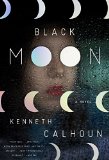Summary | Excerpt | Reviews | Beyond the Book | Read-Alikes | Genres & Themes | Author Bio

This article relates to Black Moon
Though Black Moon suggests an extreme scenario of a world without sleep, sleeplessness is a real problem in the United States. The World Health Organization defines insomnia as a "repeated difficulty with sleep initiation, maintenance, duration, and/or quality of sleep and results in daytime impairment." Insomnia is further categorized into three levels: Transient, lasting less than a week; Short-term, lasting 1-4 weeks; Chronic, lasting longer than a month. It is estimated that 50-70 million people suffer from a sleep-related disorder. Most of them are undiagnosed. Thirty to fifty percent of the general population suffers from either transient or short-term insomnia, while chronic insomnia appears in only 9-15% of the population. This last group is comprised mainly of women, older adults, and patients with chronic medical and psychiatric disorders.
Insomnia is classified as either primary or secondary. Secondary insomnia is diagnosed when a specific cause can be identified such as drug use or a health condition like asthma. Insomnia is considered primary when nothing else in the person's life, such as medications or disabilities, can be found to be triggering the sleep problems.
Regardless of cause, the effects can be debilitating. In children, insomnia can cause learning disabilities, and adults can struggle with cognitive and memory problems. In one study, people with insomnia were four times more likely to suffer from depression. In another study, subjects kept awake for 24 hours and then tested for grammatical reasoning and hand-eye coordination scored the same as a person who was legally intoxicated. It is no surprise that the National Highway Traffic Safety Administration estimates that at least 100,000 crashes and 1,500 deaths are caused by fatigue every year.
Transient and short-term insomnia can often be cured through healthy sleep habits, such as going to bed at the same time every night and making the bedroom dark. In some cases, sleeping pills may be prescribed. Treatment for chronic insomnia often includes identifying and treating any underlying medical or psychiatric problems. Sleeping pills can be prescribed and behavioral approaches - relaxation exercises or sleep restriction therapy - may be recommended.
Filed under Medicine, Science and Tech
![]() This "beyond the book article" relates to Black Moon. It originally ran in April 2014 and has been updated for the
January 2015 paperback edition.
Go to magazine.
This "beyond the book article" relates to Black Moon. It originally ran in April 2014 and has been updated for the
January 2015 paperback edition.
Go to magazine.
Your guide toexceptional books
BookBrowse seeks out and recommends the best in contemporary fiction and nonfiction—books that not only engage and entertain but also deepen our understanding of ourselves and the world around us.